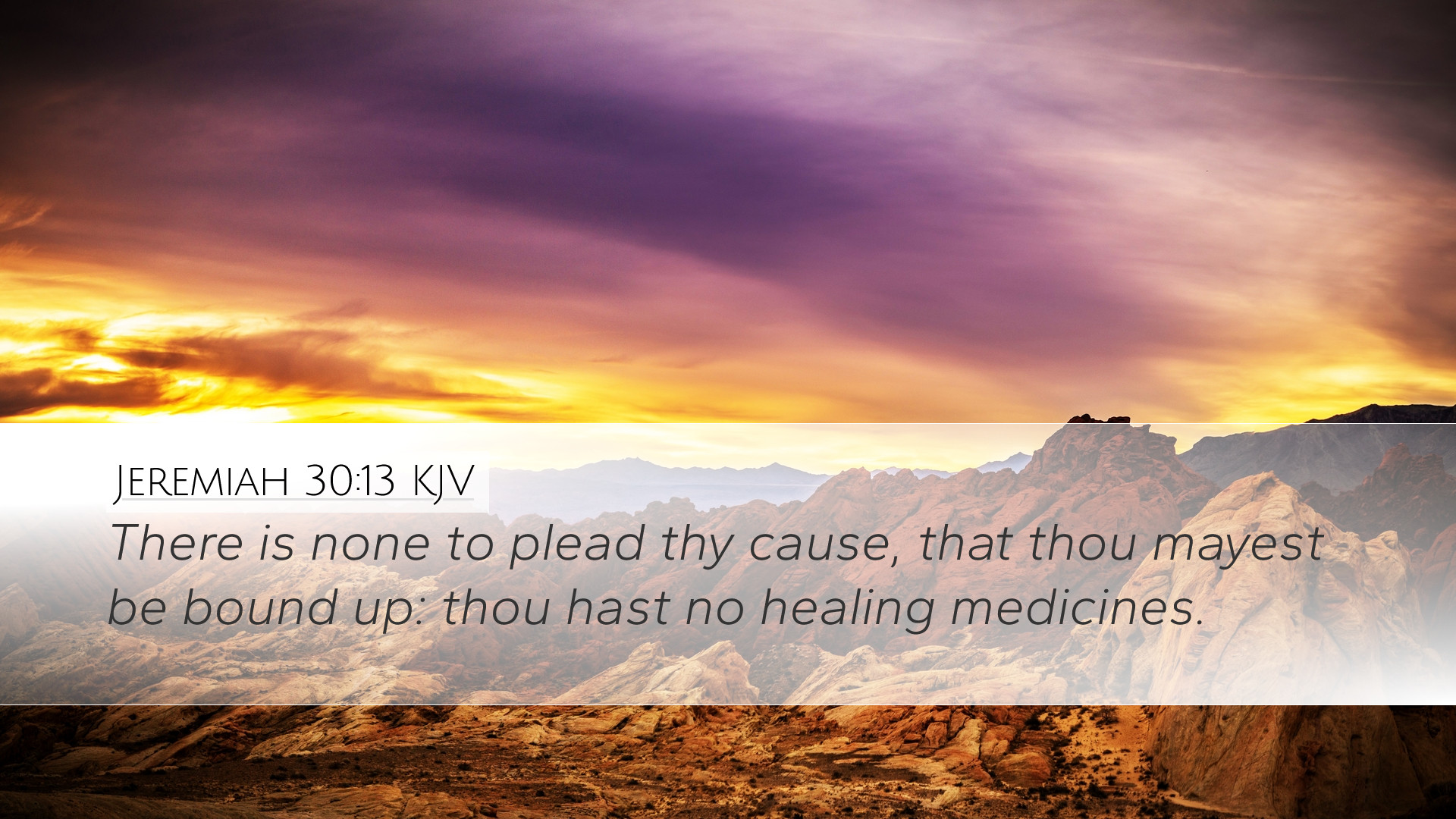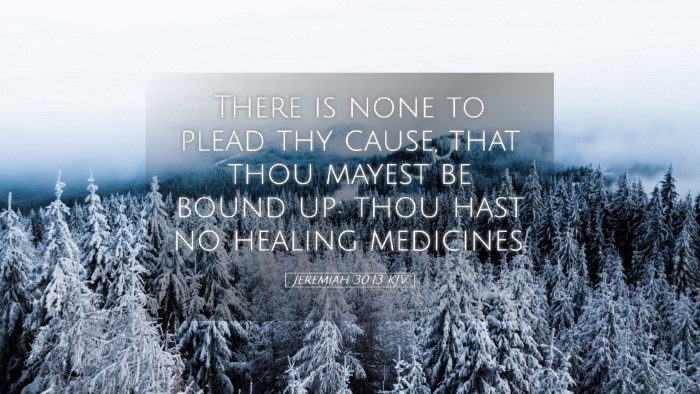Commentary on Jeremiah 30:13
Verse: "There is none to plead thy cause, that thou mayest be bound up: thou hast no healing medicines."
Introduction
This verse from the book of Jeremiah captures the essence of despair experienced by the people of Israel during their time of suffering. Jeremiah, known as the weeping prophet, highlights the absence of intercessors and the dire state of the nation at the time. The depth of their condition is further emphasized through the imagery of wounds that remain untreated and the absence of remedies. In this commentary, we draw insights from various public domain commentaries to uncover the layered meanings and theological implications of this profound verse.
The Context of Jeremiah 30
To fully appreciate the implications of Jeremiah 30:13, we must consider the broader context of the chapter. This chapter marks a significant shift in the narrative of Jeremiah's prophecies, transitioning from messages of impending judgment to those of hope and restoration.
- Historical Background: The Israelites were facing the Babylonian exile, a foreshadowing of divine judgment due to their unfaithfulness.
- Theme of Restoration: Despite the overwhelming gloom, Jeremiah 30 introduces the theme of ultimate restoration, emphasizing that God will gather His people and heal their wounds.
Analysis of Key Phrases
None to Plead Thy Cause
In analyzing the phrase "there is none to plead thy cause," we observe a stark description of isolation. Matthew Henry notes that the people of Israel were devoid of advocates in their time of trouble. He emphasizes the spiritual and social implications of this lack of intercession, indicating that even their own leaders could not stand before God on their behalf.
Albert Barnes similarly elaborates on this lack of intercessors. He suggests that this could refer to a literal absence of political and judicial advocates, but, more critically, an absence of spiritual advocates. Jeremiah points to a time where the connection between the people and God feels irreparably severed, emphasizing their desperate need for healing and mediation.
That Thou Mayest be Bound Up
This phrase indicates a longing for healing and restoration. Adam Clarke presents this imagery as a depiction of wounds that require binding—signifying both physical and spiritual healing. The implication here is that the nation, much like an injured individual, is in need of a healer who can mend their brokenness. Clarke further articulates that God, serving as the divine Physician, is the only one capable of providing the necessary restoration.
Thou Hast No Healing Medicines
The phrase “thou hast no healing medicines” speaks volumes about the state of the nation. According to Matthew Henry, this emphasizes the futility of human efforts to remedy their dire circumstances. The lack of “healing medicines” metaphorically reflects both the physical afflictions and the moral decay of the people.
Barnes elaborates that all attempts made by the people to heal their spiritual wounds have proven ineffective. This paints a portrait of a society that has turned every avenue for healing into avenues of further pain due to their neglect of God's ways. Clarke supports this view by asserting that true healing can only come from God’s intervention, as human remedies have failed them in their time of need.
Theological Implications
The implications of Jeremiah 30:13 reach deep into the theological understanding of intercession, healing, and divine restoration:
- Intercession: The absence of advocates raises questions about the importance of intercessory prayer and the role of community in seeking divine favor.
- Divine Healing: This underscores the belief that true healing—spiritual, emotional, and physical—ultimately comes from God.
- The Nature of Suffering: The verse reflects on the reality of suffering while simultaneously pointing to the hope of restoration, illustrating God’s character as both just and merciful.
Application for Modern Readers
For pastors, students, theologians, and Bible scholars, Jeremiah 30:13 serves as a pertinent reminder of several modern-day truths:
- Need for Community: The isolation experienced by Israel is a call to action for the church today to foster community and intercessory prayer.
- Placeholder for God's Healing: In a world filled with pain, individuals are often seeking healing in various forms; this verse reminds us where true healing is found.
- Recognizing Our Condition: Just as Israel needed to acknowledge their dire state, so must we recognize our need for God’s remedy in our lives.
Conclusion
In conclusion, Jeremiah 30:13 serves not only as a historical reflection on the plight of Israel but also as a timeless reminder of the necessity for intercession, the ultimate need for divine healing, and the assurance of restoration. Through the insights provided by Matthew Henry, Albert Barnes, and Adam Clarke, we are encouraged to seek God as the source of healing and restoration, acknowledging the deep connections between our spiritual state and the transformative power of divine intervention.


